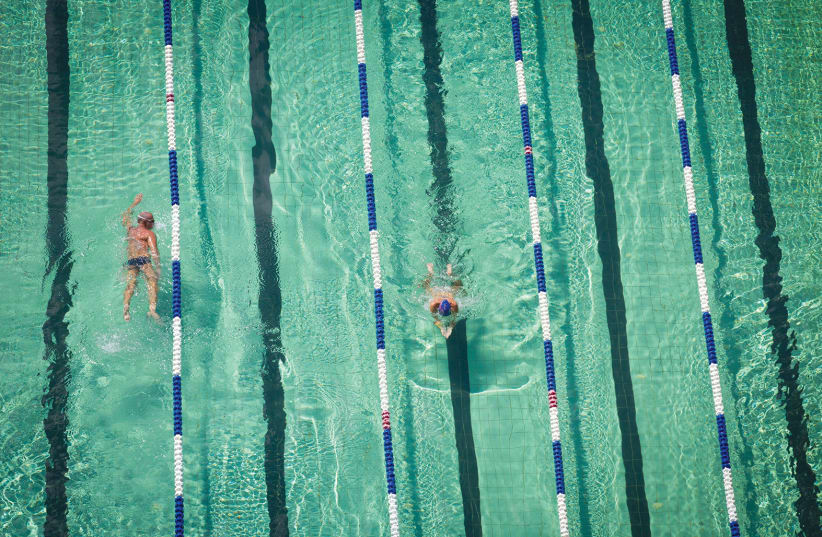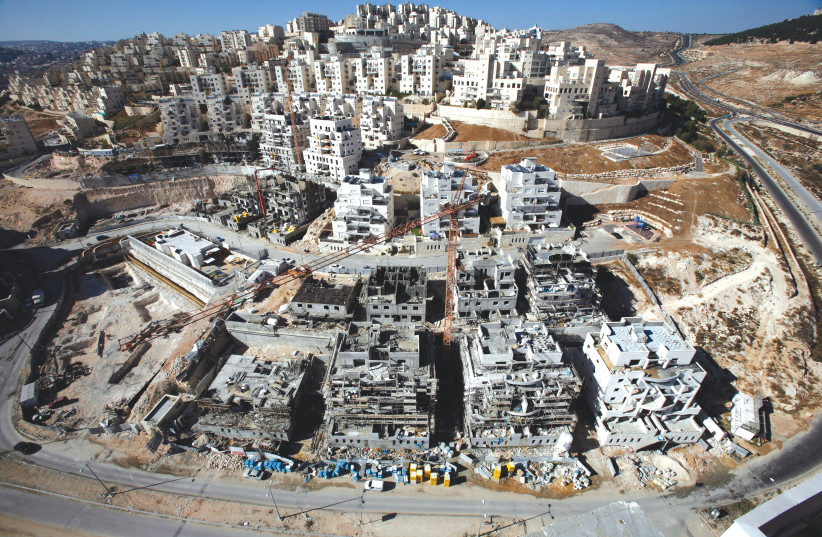To bathe or not to bathe in Har Homa?
On Tuesday morning, Jerusalem District Court Judge Miriam Ilany issued a verdict in the lawsuit filed in August 2022 by Jerusalem Deputy Mayor Yosi Havilio and representatives of residents of Har Homa against the community administration in the neighborhood, ruling that the pool will be opened on Saturdays for a period of two years, and if after that the secular public in the neighborhood also requests to close it on weekends, the matter will be reexamined. The pool will be open on Saturdays for subscribers only, and without selling tickets on the spot.
The ruling puts an end to the attempts of the chairman of the local council in the neighborhood to close the public pool, contrary to the wishes of secular and traditional residents.
Last Tuesday, a hearing was held in the district court on the petition. At the hearing, Golbari declared: “In my spiritual world, it is forbidden to disturb the Shabbat atmosphere,” and he rejected compromise proposals.
He repeated his statement, from a board meeting of the community administration, suggesting that the Har Homa residents swim in the Gilo pool on Saturdays and holidays, arguing that it can reached in almost the same amount of time as the Har Homa pool.
Havilio said at the end of the hearing: “Here is a significant test, not only for Har Homa, as an extreme elected majority tries to impose halachic lifestyles on the area and on public institutions in the neighborhood with about 40% secular and traditional, and thousands more liberal religious people who want to avoid Shabbat wars that would destroy the good relations in their neighborhood.
“I have no doubt that if the extremists win here, there will be a domino effect in all of Jerusalem, not only regarding the public pools but in general. The extremists must not be allowed to push the moderates out of the neighborhood or the city.”
More buses abound
As of this week, Egged is operating a new line, bus No. 430, from Jerusalem to Latrun and back. Residents traveling to Jerusalem will be able to park their cars in the Latrun parking lot, free of charge, and get to Jerusalem and back using the new line. The bus frequency from Jerusalem is every eight to 15 minutes.
This is one more of the new lines recently added to and from Jerusalem as part of the city’s transportation improvements. The Superbus company started operating lines in Jerusalem a year ago. Extra, which started operating four months ago in the north of the city, added two lines – No. 86 and No. 81. Within four months to a year, another line to Ramot is planned. At the beginning of the month, Superbus started operating two new lines – No. 90 and No. 516.
Location, location, location
The municipality has approved the placement of a cellular antenna barely 50 meters from a school in the Ramot neighborhood, endangering the health of 1,000 students.
The school staff, the students and their parents submitted an administrative petition to the district court against the municipality, claiming that the antenna was granted a building permit in another location and not where it is now.
The municipality staff admitted that the placement was carried out, even though a mistake had been regarding the location, but the municipality claims it was done legally.
In their appeal, the petitioners request that the decision be canceled and the antenna be removed from its current location.
However, according to the municipality, the location for the antenna was tested and approved according to the law. The local council administration welcomed the installation of the antenna, as long as it is not located near the residents. However, this is obviously not possible because one way or another, the antenna will be placed near a populated area, and there will always be someone who will object and ask for it to be moved elsewhere.
Honoring Tarada’s memory
Dozens of students from Jerusalem’s Midrashiya High School for Girls of the Shalom Hartman Institute held a memorial service for a worker who was killed at a construction site last week.
Yosef Marai Tarada, from Hebron, was killed after a heavy object fell on his head at a construction site in Old Katamon.
Last Wednesday, the students arrived at the scene of the tragedy and held a ceremony to honor Tarada’s memory, along with residents of Old Katamon; Rabbi Tamar Elad of the Zion community; Dror Amedi, CEO of Kulna Jerusalem; and activists of the Kulna organization.
Founded in 2016, Kulna is made up of members from east and west Jerusalem who are dedicated to fostering a shared society.
The ceremony opened with a minute’s silence and the lighting of candles. Social activist Heli Tabibi Barkat, daughter of Chaim Tabibi, who was killed in a crane accident 30 years ago, took part and talked to the students about her personal story.
Public outcry
Popular singer Eyal Golan has raised an uproar of protest, as he is scheduled to perform at the Jerusalem Payis Arena on February 9. Citizens wrote “Rape, shame!” in the Political Reading Facebook group. The concert is being funded by the municipality.
In 2013, a police investigation was launched against Golan on suspicion of illicit sexual intercourse with the consent of minors. Later, the prosecutor’s office announced the closure of the case due to lack of evidence. But recently, new revelations and testimonies were publicized on News 12, and Deputy Mayor Aryeh King and then-opposition head Ofer Berkowitz issued a call to prevent Golan from performing at official municipal events.
Extensive land deal
One of the city’s largest real estate deals was recently signed. Gary Burnett, founder and president of American development company Extell, has purchased land of the Greek Orthodox Patriarchate in the center of Jerusalem from Nayot Investments, owned by the Ben-David family. The property constitutes 1,000 housing units, hotels, public buildings and institutions, open spaces, and more than a dozen plots for development. The deal was signed for NIS 750 million.
This land is leased to the National Fund for Israel until 2051, with an option to extend under the conditions of a renewed lease based on the market value, in the Talbiyeh, Rehavia and Nayot neighborhoods. The lease agreement, signed decades ago between Keren Kayemeth LeIsrael-Jewish National Fund and the church, is supposed to end in 2051. At that time, quite a few residents will have to negotiate with the owner about renewing their leases.
The purchase of the rights by the Ben-David family created a situation in which residents who bought their apartments might be required to pay large sums in order to continue living in them. It is not yet clear whether there will be a change in this situation with the purchase of the lands by Extell, which has issued bonds on the Israeli stock exchange over the past eight years.
Burnett said after the deal was completed, “This is a situation where everyone benefits: the State of Israel, the city of Jerusalem, the residents, and Extell. We have a great reputation with complicated projects in the US, which involved tenants in complex situations. We are going to treat the tenants in Jerusalem with the same respect and fairness as we do in all our projects.”
Burnett added that his company entered into this project more than a decade ago, after an impasse between KKL-JNF and the church, “and we managed to resolve a conflict that the State of Israel was unable to promote, despite many efforts. We made a deal that was considered impossible, and also very risky financially. Today, after the redemption of the land has been completed, we hand over the project with a calm heart and a trusting hand to those who will complete it in the years to come.”
Amcha pays it forward
Six Holocaust survivors from the Jerusalem branch of the Amcha organization, which supports survivors and their families, were invited to the recent Hapoel Bank Yahav Jerusalem’s basketball game against Bnei Herzliya. During the halftime break, 90-year-old Amcha member Benny Unger, a Holocaust survivor, presented a gift to a young boy who is suffering from cancer and is being treated by the Zichron Menachem organization.
Unger played basketball in his youth, and his height and impressive gait are evidence of his sporting past. Unger’s son played on the youth team of Hapoel Jerusalem and served as the team’s captain.
Fence offense
German Colony residents are fighting to retain the character of their neighborhood. Their current concern is to protect the homes of foreign ambassadors and consuls. After they fought against the construction of a high metal fence around the house of the American ambassador in the German Colony, they are now confronting a high metal fence around the house of the Swedish Consulate on Rahel Imenu Street, which is being constructed without the required permits.
Following the residents’ request, the Jerusalem Municipality contacted the Swedish Embassy and reached an agreement with it to stop the work until the matter is settled.
“They are destroying the character of the neighborhood. It really hurts my heart. I passed there a few days ago and crossed the street because it is not pleasant at all to pass by the fence,” complained a resident, adding that “this is a really dangerous precedent. The picturesque nature of the neighborhood is protected here. It must not be allowed.”
As a landmark neighborhood, only stone fences are allowed, limited to a height of 20 meters. “It is clear that diplomats have special security needs, but things should be done in a controlled manner, with the city engineer and the neighborhood representatives determining what and how to build, and for whom, to minimize the damage as much as possible,” said Chava Tefferberg, an activist for the preservation of the neighborhood.
For now, the work is on hold. In the coming days, a meeting will be held between the parties to regulate the construction of the fence.
Mount Zion discussion on Zoom
The Protestant Mount Zion Cemetery and its important place in the history of Jerusalem will be the focus of lectures by scholars of the Ben-Zvi Institute next week. Two weeks ago, some 30 graves at the historic Christian cemetery were found toppled and vandalized.
Mount Zion, associated with the site of the Last Supper that Jesus shared with his disciples, is also sacred to Jews and Muslims and has been at the center of competing religious claims throughout the Israeli-Palestinian conflict.
The lecture will be held via Zoom on Thursday, February 2, from 5 p.m. to 7 p.m., with the participation of Nir Ortal, Prof. Haim Goren, Shmuel Giler, Mishy Harman, Yisca Harani, and Prof. Rehav (Buni) Rubin. ❖

